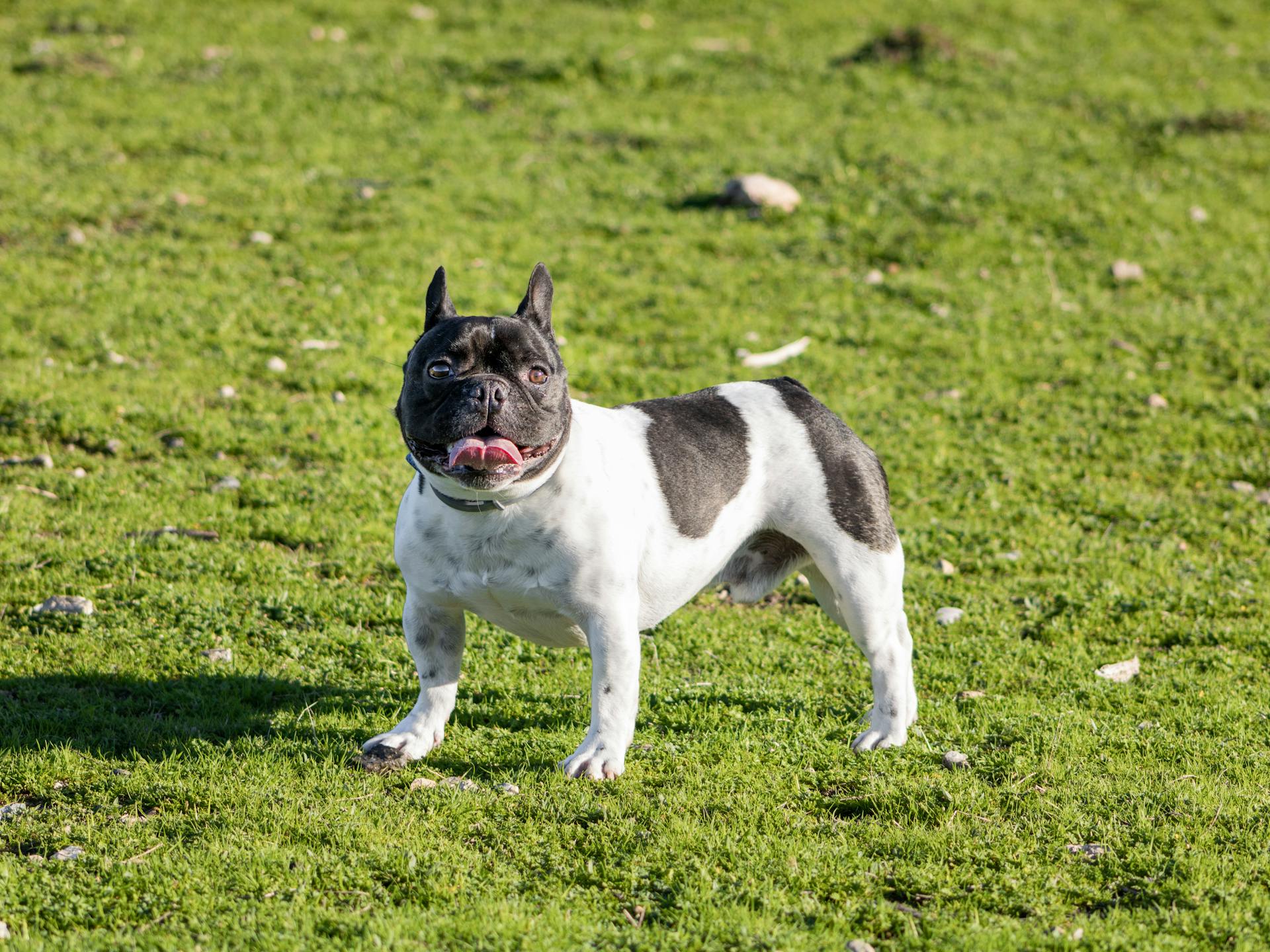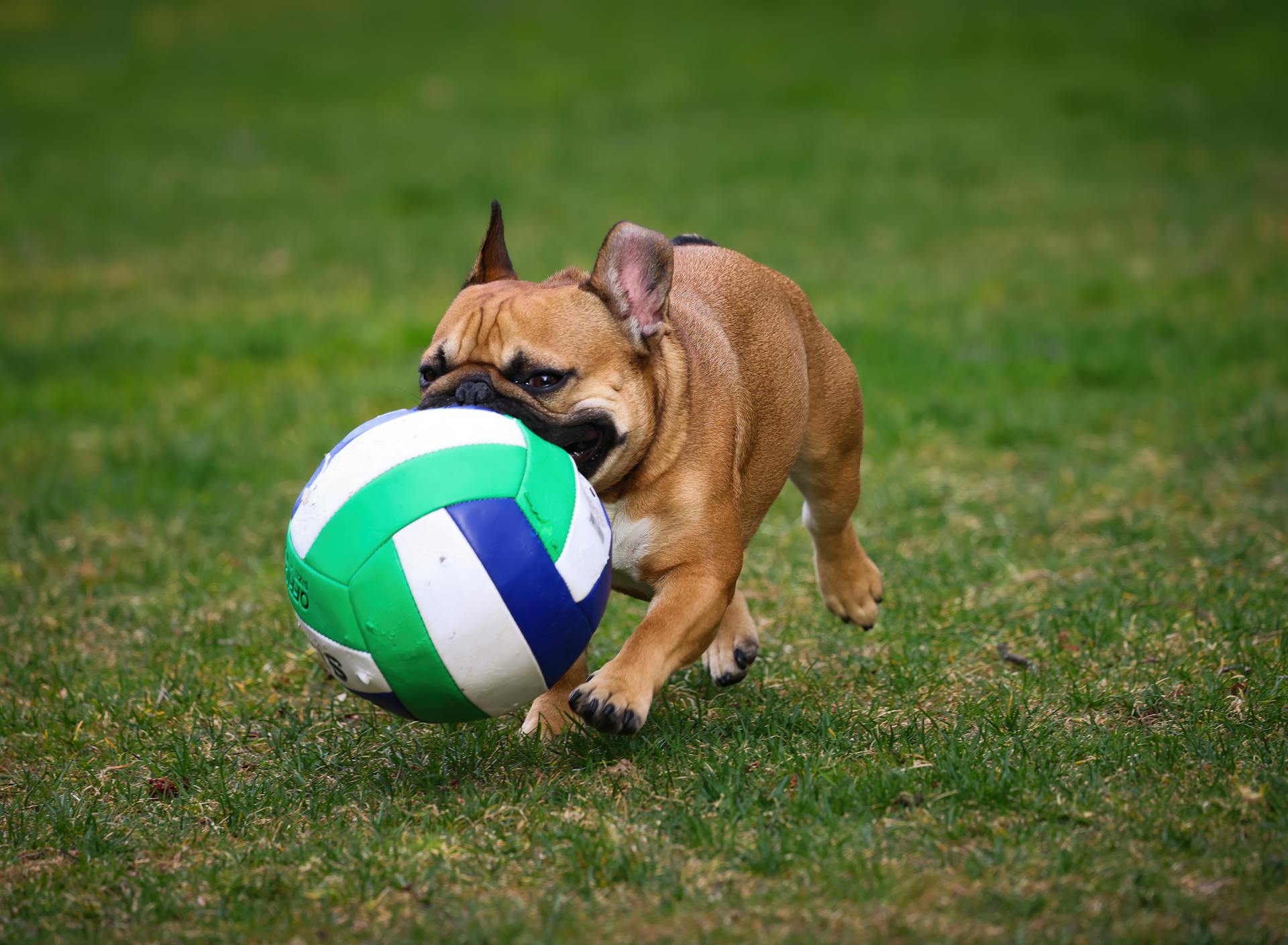
Owning a French Bulldog, or Frenchie, is a dream come true for many dog lovers. With their adorable "bat ears" and playful personalities, it's no wonder why they've become a popular breed.
French Bulldogs are a relatively small breed, with adults typically weighing between 16 and 28 pounds. This makes them a great choice for city living or for families with smaller living spaces.
Their short coats require minimal grooming, which is a bonus for busy owners. A weekly brushing and occasional nail trimming are all that's needed to keep their coats looking their best.
One thing to keep in mind is that French Bulldogs can be prone to health issues, such as respiratory problems and joint issues. Regular veterinary check-ups are essential to catch any potential problems early on.
Take a look at this: Why Does My Male Dog Keep Licking My Female Dog
History and Origin
The French Bulldog's history is a fascinating one. They originated in England in the 1800s as working dogs, bred to be bull-baiting dogs.
Their popularity soared in France, where they were prized for their gentle nature and adaptability to cramped living quarters. Lacemakers and artisans often kept them as companions.
French Bulldogs were first brought to the United States in the late 1800s and quickly became popular with American families. They were known for their friendly and playful personality.
The breed was first showcased in the United States at the Westminster Kennel Club show in 1896. They were nicknamed "Frenchie", a name still used today.
In France, French Bulldogs gained popularity during the late 1800s, particularly among Parisian society. They were adopted as pets and became an iconic part of French culture.
A fresh viewpoint: Spotted French Bulldogs
Characteristics and Traits
French Bulldogs are known for their comical personalities, with their expressive faces, silly antics, and unique personalities making them a joy to be around. They're also quite the comedians, with their ability to make funny noises, from snorts to grunts, and even some unique vocalizations that sound like they're trying to talk.
French Bulldogs are friendly and playful, loving to cuddle and play fetch, and are generally good with children and other pets, making them a great family dog. They're also intelligent and can be easily trained, especially with positive reinforcement and plenty of food rewards.
French Bulldogs are adaptable to different living conditions, making them a good choice for apartment dwellers or people with active lifestyles. They're relatively low-maintenance, requiring only moderate exercise and grooming, and are moderately good watchdogs, but poor protection dogs.
Personality
French Bulldogs are known for their unique and loving personalities. They thrive on human interaction and need to spend plenty of time with their family.
One of the most entertaining traits of Frenchies is their ability to make funny noises, from snorts to grunts and even some unique vocalizations that sound like they're trying to talk. These sounds can be quite comical and keep you laughing all day long.

French Bulldogs are also known for their playful and affectionate nature. They love to cuddle and play fetch, making them a great choice for families with children.
Despite their playful nature, Frenchies can be a bit stubborn at times. They may require patience during training, especially if they don't want to do something or go somewhere.
French Bulldogs are generally good with children and other pets, making them a great addition to many families. They're also adaptable to different living conditions and can thrive in both apartments and homes with yards.
Here are some key personality traits of French Bulldogs:
- Playful and affectionate
- Stubborn at times
- Good with children and other pets
- Adaptable to different living conditions
- Intelligent and trainable
Coat Color and Grooming
French Bulldogs come in a variety of colors, including fawn, cream, and various shades of brindle.
Their coat is short, smooth, shiny, and fine, but they can't be solid black, liver, mouse, or black with white or tan.
French Bulldogs are average shedders and need occasional brushing to keep their coat healthy.
Expand your knowledge: French Bulldogs Blue and Tan
You should begin grooming your Frenchie at a young age to make the experience easier on both of you.
Grooming can be a wonderful bonding time for you and your Frenchie if done properly.
Regular grooming sessions help you check for any scabs, skin lesions, bare spots, rough, flaky skin, or signs of infections.
Clean ears regularly with a damp, warm cloth and never stick the cotton swab into the actual ear canal.
French Bulldogs don't naturally wear their nails down, so they need their nails trimmed regularly to prevent splitting and tearing.
Keep the facial wrinkles clean and dry to prevent bacterial infections.
Bathing your French Bulldog monthly or as needed is a good practice, and use a high-quality dog shampoo to keep the natural oils in his skin and coat.
Worth a look: Grooming a Nervous Dog
Size
French Bulldogs are a relatively small breed, and their size is one of their most distinctive characteristics. Generally, they stand about 11 to 12 inches tall.
Males typically weigh between 20 to 28 pounds, while females usually tip the scales at 16 to 24 pounds.
Care and Wellness
Taking care of your French Bulldog's physical and emotional well-being is crucial. You should watch her diet, make sure she gets plenty of exercise, and brush her teeth and coat regularly.
To keep your Frenchie happy and healthy, it's essential to build a routine care schedule into your daily life. This includes supervising her as you would a toddler, keeping doors closed, and blocking off rooms to prevent her from getting into trouble.
French Bulldogs have low grooming needs, but they do require regular brushing of their coat, at least weekly. They also need their teeth brushed at least three times a week to prevent serious problems.
One of the most critical aspects of Frenchie care is their brachycephalic anatomy, which can cause breathing difficulties in hot and humid climates. You should avoid exercising them in extreme temperatures and take extra precautions to prevent heat stress.
In addition to physical care, French Bulldogs also require regular veterinary check-ups and vaccinations to prevent diseases and conditions common to the breed. Signing up for pet health insurance is also a good idea to cover medical costs throughout their life.
For another approach, see: Best Dog Food for Dogs with No Teeth
Here are some key care and wellness tips to keep in mind:
- Brush their coat weekly
- Brush their teeth at least three times a week
- Clean their ears weekly
- Check their facial wrinkles and eyes often
- Exercise them regularly, but avoid extreme temperatures
- Feed a high-quality diet appropriate for their age
- Supervise them as you would a toddler
Health Considerations
As a French Bulldog owner, it's essential to be aware of the potential health concerns that can affect your furry friend. Many diseases and health conditions are genetic, meaning they are related to your pet's breed.
French Bulldogs are more at risk for certain health issues, such as hip and elbow dysplasia, which can cause arthritis and joint pain. This condition can lead to lameness and difficulty getting up from lying down.
It's crucial to monitor your Frenchie's health closely and take preventive measures to minimize the risk of these issues. Regular check-ups with your veterinarian can help identify potential problems early on.
Parasites like fleas, ticks, and worms can infest your dog's skin and system, causing pain, discomfort, and even death. Regular testing and preventive medication can help keep your Frenchie healthy and safe.
Your Health
Your French Bulldog's health is a top priority, and understanding the potential health concerns is key to giving them the best possible care.
Many diseases and health conditions are genetic, meaning they are related to your pet's breed. This means that French Bulldogs are more at risk for certain health issues than other breeds.
Hip and elbow dysplasia are common problems in French Bulldogs, causing the joints to develop improperly and leading to arthritis. This can result in stiffness, lameness, and difficulty getting up from lying down.
We can treat arthritis with X-rays to identify issues early, and surgery may be an option in severe cases. Keeping your dog at a healthy weight is crucial, as excess weight can accelerate arthritis and cause unnecessary pain.
Genetic predispositions can't be changed, but being aware of them allows us to take preventative measures and catch potential issues early. By working together, we can create a personalized health plan to keep your French Bulldog happy and healthy.
Parasites
Parasites can invade your French Bulldog's body, inside and out, in many ways.
Fleas and ticks are common skin parasites that can infest your dog's skin and ears, while ear mites specifically target the ears.
Hookworms, roundworms, heartworms, and whipworms can get into your dog's system by drinking unclean water, walking on contaminated soil, or being bitten by an infected mosquito.
These parasites can cause pain, discomfort, and even death in your dog, making regular testing essential.
Countryside Veterinary Clinic recommends testing for these parasites on a regular basis and will also prescribe preventive medication as necessary to keep your dog healthy.
Spay or Neuter
Spaying or neutering your French Bulldog is a crucial step in maintaining their health and well-being. It decreases the likelihood of certain types of cancers.
Performing this surgery also gives us a chance, while your pet is under anesthesia, to identify and address some of the diseases your dog is likely to develop, such as needing hip X-rays or a puppy tooth extracted.
Routine blood testing prior to surgery helps us to identify and take precautions for common problems that increase anesthetic or surgical risk.
Spaying or neutering eliminates the possibility of your pet becoming pregnant or fathering unwanted puppies.
Allergies
Allergies can cause some pretty uncomfortable symptoms in our furry friends. In dogs, allergies make their skin itchy, and this skin allergy is called "atopy".
French Bulldogs are prone to atopy, and it often affects their feet, belly, folds of the skin, and ears.
Symptoms typically start between the ages of one and three, and can get worse every year.
Mange
Mange is a common skin condition in dogs that can cause dry, irritated, hairless lesions on the face or feet. These lesions may or may not be itchy.
Demodex, a microscopic mite, is the culprit behind mange. All dogs have them, but some breeds develop an overabundance of these mites.
In mild cases, pet owners may notice a few lesions, while in more severe cases, secondary skin infections can occur.
Skin Infections
French Bulldogs are prone to a type of skin infection called lip-fold pyoderma, which occurs in the moist skin folds along the lower jaw.

This condition can cause a reddened, smelly area that's uncomfortable for your dog.
Bacteria and yeast can easily take hold in these areas, leading to infection.
Prompt veterinary care is crucial to treat this condition, which may require antibiotics.
If symptoms are severe, the excess skin folds can be surgically removed.
Your dog's immune system can help keep Demodex mites in check, but some breeds, like French Bulldogs, may develop an overabundance of these mites.
This can lead to secondary skin infections, which can be a concern.
In mild cases, you may notice dry, irritated, hairless lesions on your dog's face or feet.
These lesions may or may not be itchy.
Frequently Asked Questions
Why are Frenchies so expensive?
French Bulldogs are expensive due to the high costs associated with breeding, including artificial insemination and C-sections for mothers. This increased investment is passed on to buyers, making them a pricey but beloved companion.
Is a Frenchie the same as a French bulldog?
Yes, "Frenchie" and "French Bulldog" are interchangeable terms referring to the same breed of dog. They originated in Normandy, France as companion dogs, not for fighting or bull-baiting.
What type of dog is a Frenchie?
A French Bulldog is a small, nonsporting dog breed that originated in France. It's a unique companion dog with distinctive bat-like ears and a playful, affectionate personality.
Why are Frenchies so special?
French Bulldogs are ideal city dogs due to their adaptability to small spaces and affectionate nature. However, their unique structure requires special consideration when it comes to certain activities.
Featured Images: pexels.com


